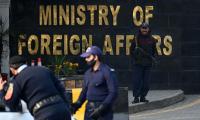ISLAMABAD: The government on Friday unveiled a tax-free budget with a wide fiscal deficit for 2020/21, proposing no increase in salaries of its employees and pensioners, rise in levies on luxury products, and tax relief for cement sector, sanitary wears and locally-manufactured mobile phones.
The government presented the federal budget 2020/21 with a total outlay of Rs7.136 trillion, a little expansionary to get economic recovery as already the economy has contracted in the outgoing fiscal year for the first time since 1952 due to COVID-19.
Tax revenues have been targeted at Rs5.464 trillion against the revised estimates of Rs4.208 trillion for the outgoing fiscal, depicting an increase of 29.8 percent. Of total tax collection, the FBR’s collections target has been increased by 27 percent to Rs4.963 trillion against the revised estimates of Rs3.91 trillion.
Increase in tax will put more burden on existing taxpayers. Besides, the development budget has been reduced over the last year.
Economic experts said since the economic growth is low, how the government will attain this tax collection target and GDP growth of 2.1 percent. They expected higher budget deficit than the targeted 7 percent of GDP (or Rs3.195 trillion). Primary balance has been targeted at minus 0.5 percent of GDP.
Minister for Industries and Production Hammad Azhar, while presenting the budget in the National Assembly, termed it as crisis budget due to coronavirus that is affecting the economy.
Azhar said current account deficit will be contained at $ 4.4 billion for fiscal year 2020/21, while foreign direct investment will be increased by 25 percent.
Non-tax revenues revenue has been targeted at Rs1.109 trillion as against revised estimates of Rs1.296 trillion in the current fiscal year. The provinces will get share of Rs2.874 trillion in the next fiscal.
External receipts (project loans, program loans, grants) have been targeted at Rs810 billion against the revised estimates of Rs2.27 trillion. Besides, provincial surplus has been estimated at Rs242 billion, bank borrowing at Rs889 billion and privatisation proceeds atRs100 billion.
Current expenditures (spending on interest payments on loans, pension, defence affairs and services, grants and transfers, subsidies and running civil government) will be Rs6.344 trillion in FY2021. Of the total amount, the interest payment on local and foreign loans will be the biggest expenditure head as it will consume Rs2.946 trillion.
Defence expenditure is the second biggest head, for which Rs1.1289 trillion have been earmarked against the revised estimates of Rs1.227 trillion in the outgoing fiscal.
For running civil government, Rs475.7 billion and for grants and transfers Rs843.4 billion have been allocated. The government also reduced spending on subsidies to Water and Power Development Authority, K-Electric, Utility Stores Corporation, Pakistan Agricultural Storage and Services Corporation by 40.2 percent to Rs209 billion. Federal PSDP has been earmarked at Rs650 billion from last year allocation of Rs701 billion.
The discouraging fact of the budget for the public sector employees is that the government has not increased salaries and pensions and also frozen the minimum wage.
Besides, the government has not changed the taxable income slabs of salaried class.
The minister said the GDP growth got a hit of Rs3.3 trillion due to coronavirus crisis that brought down its growth from 3.3 percent to negative 0.4 percent. Almost the whole industry and retail businesses have been affected. Projection of overall budget deficit has been revised upward from 7.1 percent to 9.1 percent of GDP in FY2020. FBR revenue loss has been projected at Rs900 billion. Non-tax revenue of the federal government has been reduced by Rs102 billion. Exports and remittances have been badly affected and unemployment and poverty has increased.
To mitigate its negative impacts, government approved stimulus package of more than Rs1.2 trillion. The component of Rs875 billion has been funded through the federal budget comprising Rs75 billion allocated for purchase of medical equipment, protective kits and payments to health workers, Rs 150 billion allocated for 16 million vulnerable families and Panagah, Rs200 billion allocated for cash transfer to daily wage workers/employees, Rs50 billion allocated for Utility Stores for provision of subsidised goods, Rs100 billion allocated for FBR and Ministry of Commerce for issuance of refunds to exporters, Rs100 billion allocated for power and gas bill deferral, Rs50 billion for payment of electricity bills of three months of three million small businesses, Rs50 billion allocated for farmers for fertiliser subsidy, loan remissions and other relief and Rs100 billion allocated for establishment of emergency fund.
Besides tax relief of Rs15 billion on food and health items, there will be payment of Rs280 billion to farmers for wheat procurement. Price of petrol was reduced by Rs42 per litre and diesel by Rs47 per litre, which provided relief of Rs70 billion to the people.
The minister said no new tax has been levied. For protection of vulnerable segment of society, budget allocation for Ehsas program has been increased from Rs187 billion to Rs208 billion. This includes various social safety initiatives including BISP, Pakistan Bait-ul-Mal and other departments.
Higher education budget has been increased from Rs57 billion to Rs64 billion. An amount of Rs30 billion has been provided to Naya Pakistan Housing Authority. Moreover, an amount of Rs1.5 billion has been allocated for low cost housing through scheme of Qarz-e-Hasna of Akhuwat Foundation.
In special areas, Rs55 billion has been allocated for Azad Jammu and Kashmir, Rs32 billion for Gilgit Baltistan and for merged district of Khyber Pakhtunkhwa, Rs56 billion have been allocated. Moreover, special grant of Rs19 billion has been provided to Sindh and Rs10 billion to Balochistan over and above their national finance commission share.
To improve foreign remittances through banking channels and build up foreign exchange reserves, an amount of Rs25 billion has been allocated. A grant of Rs40 billion has been allocated to Pakistan Railways
To provide relief to the agriculture sector and withstand the threat of Locust, funds to the tune of Rs10 billion have been allocated.
In energy sector, Rs80 billion has been allocated for power expansion and improving transmission and distribution system to minimum circular debt. For water sector projects, Rs69 billion has been earmarked.
The government has allocated Rs118 billion to National Highways Authority, and Rs24 billion to Pakistan Railways for the development of its infrastructure including ML-1. For other communication projects, an amount of Rs37 billion has been allocated.
Sales tax on point of sales has been reduced from 14 percent to 12 percent. The government wants to increase installation of point of sales to 15,000 by next year against current 6,616 points.
Minimum tax on hotel industry has been reduced from 1.5 percent to 0.5 percent. Automation is being introduced to pay exports rebates to exporters in their bank accounts without human intervention.
Raw materials for chemicals, leather, textiles, Rubber and fertilisers are being exempted from all custom duties. They constitute around 20,000 items and forms 20 percent of total imports.
Custom duty on raw materials and intermediary items for 200 tariff lines has been substantially reduced. These include bleaching and rubber and home appliances. On hot rolled coils regulatory duty has been reduced to 6 percent from 12.5 pc that would help boost steel pipes, underground tanks and boilers industry. To safeguard clothes, sanitary wares, electrodes, blankets, pad locks industry, regulatory duty has been reduced.
To support poor for diagnostic of coronavirus and cancer, duties have been removed on its kits.
Federal excise duty on imported cigarettes, Beri, cigars has been increased from 65 percent to 100 percent. E-cigarettes have also been included in it. FED on caffeine drinks has been increased from 13 percent to 25 percent. Aerrated drinks are already under 13 percent FED. Taxes on double cabin pickups have been equalised with the other vehicles of the same price. FED on cement has been reduced from 2/kg to Rs1.75/kg. Sales tax on locally- manufactured cell phones has been reduced. Income tax on raw material imports has been reduced from 5.5 percent to 2 percent and on machinery it has been slashed to 1 percent from current 5.5 percent.
No advanced tax will be levied on auto rickshaw, motorcycle rickshaw and up to 200cc motorcycles.
To encourage the residential buildings under REIT scheme, the profit achieved from immovable property sale has been exempted from tax, provided that the buildings are completed till June 2020, but now this time has been increased to June 2021. On toll manufacturing, tax has been reduced from 8 percent to 4 percent for companies and 4.5 percent for others.
Capital gains tax duration on immovable property has been reduced from 8 years to 4 years. Every year CGT rate will decrease by 25 percent. Besides, 50 percent reduction has been made in CGT.
Khawar Manika's counsel continued his arguments on Wednesday in a petition filed by Imran Khan and Bushra Bibi
IHC reserved judgment on the petition against registration of cases against former interior minister Sheikh Rashid on...
Saudi woman who was reportedly kidnapped from Islamabad’s residential Sector F-8 in mysterious circumstances, has...
Pakistan Navy warship rescued 8 Iranian fishermen after their boat caught fire in the open sea
SC dismissed appeal against SHC order that turned down application of partner seeking extension of time to furnish...
Executive board of International Monetary Fund will meet on April 29 to discuss the approval of $1.1 billion funding...







